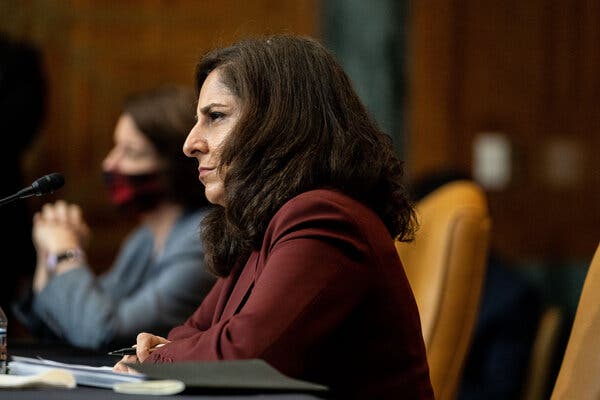As some prominent economists fret that the government might overdo its pandemic response and prompt prices to shoot higher, the nation’s top inflation fighter has a message: Policymakers should stay focused on restoring full employment.
“Given the number of people who have lost their jobs and the likelihood that some will struggle to find work in the post-pandemic economy, achieving and sustaining maximum employment will require more than supportive monetary policy,” Jerome H. Powell, the chair of the Federal Reserve, said in speech prepared for delivery before The Economic Club of New York on Wednesday. “It will require a society-wide commitment.”
Mr. Powell called policies that bring the coronavirus pandemic to an end as soon as possible “paramount” and said that both workers and businesses who have had their livelihoods disrupted by the crisis “are likely to need continued support.”
The Fed chair noted that unemployment remains sharply elevated at about 10 percent, adjusted for improper classification and recent workforce dropouts, compared to 3.5 percent last February. And he pointed out that virus fallout has been unevenly felt. Workers earning high wages have seen employment drop by just 4 percent, he said, while the decline for the bottom quartile has been “a staggering 17 percent.”
Separately, he noted, “Inflation has been much lower and more stable over the past three decades than in earlier times,” later adding that he would not expect a long-lived pickup in inflation coming out of the pandemic.
“Nothing in the economy is really permanent,” he said of inflation dynamics. “But it’s hard to make the case why they would evolve very suddenly.”
Economists have often seen high employment and low inflation as conflicting goals. Pursuing policies that foster strong demand and pull workers back into the labor market can also push up wages as businesses compete for talent and prompt companies to raise prices both because they need to pass along their rising costs and because eager consumers will accept such increases.
But the arithmetic has shifted in recent decades, as inflation remained mired below the Fed’s 2 percent goal even during long periods of very low joblessness.
The Fed chair’s comments come at a time when President Biden’s administration has proposed a $1.9 billion pandemic relief package that would include everything from health response measures to another round of direct payments. Some economists, including former Treasury Secretary Lawrence H. Summers, have warned that the large package could risk touching off long-dormant price increases. And many Republican lawmakers have also cited that risk as a reason to oppose the package.
Mr. Powell did not weigh in on the package specifically, but he and his colleagues have generally pushed for more fiscal support for the economy throughout the coronavirus era, saying that the bigger risk is doing too little rather than doing too much.
“I’m reluctant to get into what is clearly a very active debate,” Mr. Powell said, when asked specifically about fiscal policy, though he added that “it is the essential tool for this situation” and that it is hard to pin down how far output has to recover before it might push the economy toward overheating.
The Fed’s own policies are already set to stimulate growth. The central bank cut interest rates to near-zero in March 2020 and has been buying about $120 billion in government-backed bonds per month. Its policies are aimed at keeping borrowing cheap and credit flowing to companies and households.
The federal budget deficit for January swelled to $163 billion as the government pumped more relief money into the economy to combat the pandemic, the Treasury Department said on Wednesday.
The mounting red ink reflects the toll the pandemic has taken on the U.S. economy in the last year and is a growing political concern as lawmakers rush to pass another relief package, which could cost nearly $2 trillion.
The shortfall was a record for January. For the fiscal year to date, the United States has amassed a record $736 billion deficit, as spending continues to rapidly outpace government revenue.
The deficits were sharp increases from a year earlier, when the government recorded a January shortfall of $33 billion and a deficit of $389 billion for the first four months of the fiscal year. A Treasury official said economic stimulus payments and unemployment insurance had contributed to the widening gap.
On Thursday, the Congressional Budget Office will release its 10-year economic outlook and budget projections. The figures are likely to highlight the dire fiscal situation facing the United States.
Republicans have been expressing growing alarm about debt and deficits since President Biden took office, shrugging off the big spending that took place under his Republican predecessor, President Donald J. Trump.
There has been a debate among left-leaning economists about how much stimulus is necessary, and how it should be targeted, to avoid letting the economy overheat.
The Biden administration and Treasury Secretary Janet L. Yellen have called on lawmakers to pass a robust package, arguing that the cost of doing too little to help struggling workers outweighs the threat of inflation, which can be contained.

A simmering rift within the Democratic Party spilled into public view on Tuesday as Senator Bernie Sanders, the chairman of the Senate Budget Committee, pressed Neera Tanden, President Biden’s nominee to head the Office of Management and Budget, over millions of dollars of corporate donations that the Center for American Progress received under her watch.
The tough line of questions was a rough patch for one of Mr. Biden’s cabinet picks and underscored the lingering tension between the Democratic Party’s progressive and moderate wings. Ms. Tanden, president of the liberal Center for American Progress think tank, served in the Clinton and Obama administrations and was a top aide to Hillary Clinton during the 2016 presidential campaign.
“Now, Ms. Tanden, at a time when the wealthy and large corporations have extraordinary influence over the economic and political life of this country, I must tell you that I am concerned about the corporate donations the Center for American Progress has received under your leadership,” Mr. Sanders said in his opening statement. “Before I vote to confirm your nomination, it is important for this committee to know that those donations will not influence your decision making at O.M.B.”
Mr. Sanders cited a report that found that the center received at least $38 million from corporate America since 2014.
Mr. Sanders also questioned Ms. Tanden about her criticism of him and his allies.
“There were vicious attacks made against progressives, people who I have worked with, me personally,” Mr. Sanders said.
Ms. Tanden and Mr. Sanders have clashed since the 2016 election, with Mr. Sanders accusing Ms. Tanden in 2019 of “maligning my staff and supporters and belittling progressive ideas” after ThinkProgress, an independent editorial branch of Ms. Tanden’s think tank, criticized Mr. Sanders for the size of his income from writing a book.
On Tuesday, during her first confirmation hearing before the Senate homeland security committee, Ms. Tanden faced similar criticism — only from Republicans, who spent the first hour grilling her over her Twitter posts and asking why she deleted more than 1,000 posts shortly after the November election.
Senator Rob Portman of Ohio read aloud posts in which she called Senator Mitch McConnell of Kentucky, the minority leader, “Moscow Mitch,” and said that “vampires have more heart than Ted Cruz,” a Republican senator from Texas.
Ms. Tanden apologized to that committee and said that she deleted some of her tweets because she regretted her tone.
At the Wednesday hearing, Senator Lindsey Graham of South Carolina, the top Republican on the committee, said that he was not overly concerned with the donations that Ms. Tanden oversaw but brought up her criticism of both Republicans and Democrats.
“Her scorn was not limited to Republicans,” Mr. Graham said. “This is not the unifying pick that I was looking for in this position.”
Mr. Graham also leaned into the tensions between Ms. Tanden and Mr. Sanders, dusting off previous criticism that she leveled at the Democratic Socialist from Vermont, including comments suggesting that Russia tried to help the Sanders campaign in 2016.
Seriously this is ridiculous. I’m not for litigating the primary, but from what we know now, Russia did a lot more to help Bernie than the DNC’s random internal emails did to help Hillary. Try to actually look at some facts. This whole attack is a joke.
— Neera Tanden (@neeratanden) February 18, 2018
In her opening statement on Wednesday, Ms. Tanden insisted that she would work in a bipartisan fashion if confirmed. She noted that some of her abrasive language in the past was because of her role as a political activist and she apologized for offending people with her comments on social media.
“I apologize to people either on the left or right who are hurt by what I said,” Ms. Tanden said.

Michelle Obama will be the star of a children’s cooking show.
Netflix announced this week that Mrs. Obama will be featured alongside a pair of puppets in a series called “Waffles + Mochi.” The 10-episode series makes its debut March 16.
The series is the latest project from Mrs. Obama and Barack Obama’s production company, Higher Ground Productions. The Obamas, who signed a deal with Netflix in 2018, have so far produced three documentary films for the streaming service. Mrs. Obama was the centerpiece of “Becoming,” a 2020 documentary that followed her on her book tour after her memoir of the same title was published.
Last week, the Obamas announced that they had several scripted projects in development for Netflix, including an adaptation of “Exit West,” a critically adored 2017 novel about refugees, and an animated series based on a Michael Lewis book.
In the cooking show, Mrs. Obama will play a supermarket owner who helps two puppet pals, Waffles and Mochi, fulfill their dream of becoming chefs. Mrs. Obama has long promoted health and nutrition, and the Obamas said when they signed with Netflix that they would create a children’s show.
“Waffles + Mochi” has been in development for nearly two years. In 2019, Netflix announced an earlier version of the show, “Listen To Your Vegetables & Eat Your Parents.” The production team for “Waffles + Mochi” includes Erika Thormahlen, a writer and actress, and Jeremy Konner, a producer of Comedy Central’s “Drunk History.”

U.S. markets
-
The S&P 500 was up slightly Wednesday afternoon after spending much of the day in the red.
-
General Motors reported $6.4 billion profit for 2020, as brisk sales of pickup trucks and sport-utility vehicles in the fall offset the pandemic disruptions in the spring. Its shares were down more than 1 percent, however.
-
Twitter’s shares were up 12 percent after the company said on Tuesday that its revenue rose 28 percent in the fourth quarter compared with the previous year.
-
Lyft jumped more than 5 percent after the company’s fourth-quarter revenue — although down sharply from a year ago — was higher than the previous period.
Commodities
-
Commodities prices rose to multiyear highs as traders anticipated stronger demand for raw materials to aid the economic recovery. West Texas Intermediate futures, the U.S. crude benchmark, gained 0.65 percent to $58.74 a barrel, the highest level since April 2019. Brent prices climbed to $61.50 a barrel, the highest since July 2019.
-
Copper prices, which have been climbing for 10 straight months, approached an eight-year high in London trading. The metal is seen as good predictor for the direction of the global economy given its broad usage, especially for the wiring for power transmission.
Europe
Asia

United Airlines plans to invest in and buy as many as 200 aircraft from Archer Aviation, an electric air taxi start-up that announced plans on Wednesday to go public, in a deal that Archer said valued it at about $3.8 billion.
“Part of how United will combat global warming is embracing emerging technologies that decarbonize air travel,” United’s chief executive, Scott Kirby, said in a statement on Wednesday. “By working with Archer, United is showing the aviation industry that now is the time to embrace cleaner, more efficient modes of transportation.”
United is investing about $20 million in Archer, and an additional $5 million will come from Mesa Airlines, which operates regional flights for United and others. The airline’s tentative aircraft order is valued at up to $1 billion, Archer said in a statement. United said it would only purchase the aircraft once they were available and had met its operating and business requirements.
The aircraft, which can travel at speeds of up to 150 miles an hour for up to 60 miles, would be used within the next five years to let United’s customers commute in dense urban areas or quickly reach the airline’s airport hubs, United said. The aircraft are set to debut this year, according to Archer, which is based in California.
The news follows United’s announcement late last year that it plans to become carbon-neutral by 2050, in part by investing in a “direct air capture” plant in Texas that will remove carbon dioxide from the sky and inject it underground.
Archer said it planned to go public via a sale to a blank-check company, also known as a special purpose acquisition company. The vehicle, Atlas Crest Investment, is an affiliate of the investment bank Moelis & Company. Ken Moelis, the bank’s founder, is investing in the deal alongside other senior bankers and Walmart’s former e-commerce chief, Marc Lore, by contributing to the $600 million “private investment in public equity.” Other investors include the newly formed carmaker Stellantis.
Moelis leaned on its bankers, client relationships and external consultants to conduct the due diligence required for investing in new airline technology and SPACs, Mr. Moelis said in an interview.
“We had 35, 40 people on this — and we attacked this like venture growth would or anybody else,” Mr Moelis said. “And we did it fast, too.”
United Airlines is a client of Moelis, and the bank expects that Archer will be as well.
The company expects to be listed on the New York Stock Exchange under the ticker ACHR.
-
Aunt Jemima formally rebranded itself on Tuesday as the Pearl Milling Company, moving one step closer to permanently abandoning the breakfast product line’s likeness that critics had long said perpetuated a racist stereotype for more than a century. The new name comes from the milling company in St. Joseph, Mo., that pioneered the self-rising pancake mix that became known as Aunt Jemima.
-
Heineken, the big brewer based in Amsterdam, said on Wednesday it would lay off 8,000 workers, or almost 10 percent of its work force, as it confronts a steep fall in beer sales to restaurants and bars closed because of the pandemic. The company reported an 18 percent drop in net revenue for 2020, and a 79 percent fall in operating profit. Dolf van den Brink, the chief executive, called it a “year of unprecedented disruption and transition.”
-
Lyft said on Tuesday that revenue for the fourth quarter of 2020 was $570 million, a 44 percent decline from the year before but in line with Wall Street expectations. Losses increased 22 percent, to $458.2 million. Revenue for 2020 was down 35 percent, to $2.4 billion.
-
Twitter said on Tuesday that its revenue in the fourth quarter last year was $1.29 billion, a 28 percent increase from the previous year and slightly above Wall Street expectations. Profit for the quarter was $222 million, bolstered by a turnaround in income after a significant drop in ad spending earlier in 2020. The company lost $1.14 billion for the year.





